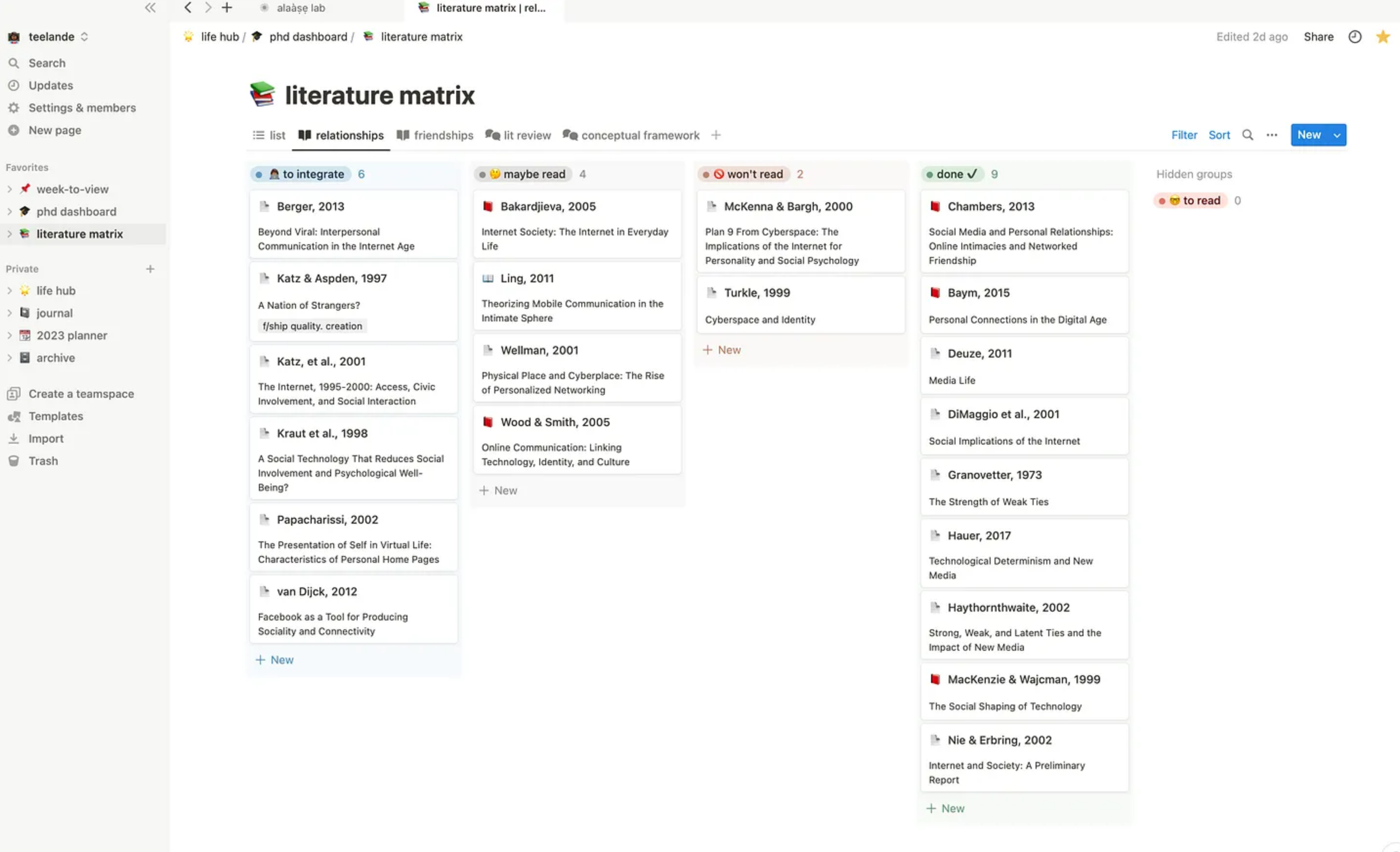research notes: #1
learning to love the literature review
I would argue that the literature review is the thing most associated with the doing of a PhD. Before I started my PhD, I often imagined myself sitting with books, highlighter out, scribbling away summaries and my thoughts on whatever I was reading. I was mostly correct —except most of what I read are academic journal articles (80%) rather than book chapters/books (20%).
The literature review is at once systematic outlining of relevant research to your field and research questions, critical analysis, and storytelling. It’s storytelling, because writing the/a literature review is a craft: if done well, it deftly shapes the background context the thesis is situated in while building a narrative of why this particular thesis is needed. If done poorly, it’s a long, dreary read of various studies that don’t coherently tell the reader (examiner) why you chose these research questions, or anything at all, except: people did some research.
My Notion literature review page — how I organise literature
But what do I know? I don’t have my PhD yet and I haven’t submitted my literature review chapter yet, either 🙃. But I have read a lot of literature reviews: in article form, in book chapters, and in other theses. I like to think I can identify what separates the good from the bad.
One of the most brilliant theoretical articles I have read is by Sarah Elwood, titled “Digital Geographies, Feminist Relationality, Black and Queer Code Studies: Thriving Otherwise.” Elwood’s work is transdisciplinary like mine; they are a Professor and Chair in the department of Geography. Elwood’s “Current activities include research on poverty politics of creative activisms around homelessness, feminist and critical race theorizations of digital geographies, and a collaborative public scholarly project on horizons of critical poverty studies under emerging nationalist populisms”.1
In the above article, they theorise an alternate practice of life and thriving that is grounded in Black and Queer code studies and feminist relationality. To do so they contextualise the epistemological urgency of alternate theorisations with a literature review to devastating effect. I was reading and nodding and highlighting all over this article. I was moved, even when I didn’t fully understand what Elwood was saying (I think it’s quite a dense read). I could feel the urgency and the importance of their intervention. In short: it’s goodt ass writing. Take the following as an example:
Elwood 2021, p. 211
Elwood here makes a point: that there is a need to theorise technological mediation beyond formulations of dominance and extraction, while citing scholarship that supports this argument. This looks like a simple paragraph but it’s not. To write this way is to have read and thought and considered so much. Plus, when it is commonly said amongst academics that a majority of us (them?..not me chile) can’t write…it stands out when you can.
As the subtitle of this issue hints at: I am currently writing my literature review. It is hard work. The organising of knowledge, the sorting and parsing of that information, the breadth required and the depth required to illustrate the landscape your work exists in and the story you are trying to tell. I’m tired!!!!!!!!!!!!!!!!!!!
My research is about digital intimacy. It’s also about Black women’s online practices and behaviour. I connect the latter to diaspora, relationality and Black feminist praxis of belonging/care. This means I need to cover: interpersonal relationships online, racialised and gender online communicative practice, mediated friendship and digital intimacy as empirical study and concept. I also need to cover the other concepts of intimacy, diaspora, friendship and relationality. Basically: I be reading.
I was talking with other Black women PhDs and Drs and we’re unanimous: the literature review is a hoe. It is somewhat generative, but it’s also the most draining, and least ROI-giving part of the PhD. And there’s nothing you can do but go through it.
So yeah: it might kill me for real. But it’ll be worth it if the story is there.
1 https://geography.washington.edu/people/sarah-elwood
744 hours later
one month since my mother died.
It's been a month today. Thirty times I have managed to get myself through the day and night since you've been gone. It's been three months since my life was turned upside down and six months since I last felt happy.
It still doesn't feel real. It was only in November that we learned you were sick. I remember on December 2nd, when Dad told me the doctor suspected cancer. I cried in disbelief but I also kind of thought it was a mistake. Cancer?? I thought —but how? What happened to the gallstones, surely they're confused? It's not cancer.
I think I stayed in that confusion, (or was it denial) until the end. I wouldn’t, or couldn’t believe it. I could see you deteriorating before my eyes each day, but I thought they had it wrong. I mean, they didn't actually confirm that it was cancer until the week of December 21st, so who can blame me for thinking it was a mistake. After we found out, I felt numb. I wanted to disappear. I was protecting myself and I didn't want you to see my fear. You said you were scared — you didn't need to worry about me being scared too.
I made the mistake everyone did. I thought we had time.
Time for you to give chemotherapy a go; time for you to get better; time to spend together. Even though I knew that a majority of cancer diagnoses end with death, I thought, even if it's hard and miserable, at least you'll have chemotherapy and we'll re-assess after that." We all did.
I hate that we didn't have that time. I hate that this disease snuck up on you — there’s nothing to prepare anyone for to knowledge that they have terminal cancer. I hate that you couldn't finish your PhD, something you worked your ass off for, something you were so passionate about, something that you were so, so, close to finishing. You only had six months left till it was done. I hate, and it pains me that the last months of your life you were stuck in and out of hospital were fraught with worry, fear, pain, anxiety, sadness and stress.
That's what gets me the most: you didn't even know you were dying until it was too late. Everyone says to enjoy each day as though it's your last, but it's a bit fucking hard to do so when you're bed-bound because of pain and you're not even sure what's going on with your own body.
Needless to say, but, I fucking hate cancer.
I think about you every single day - and sometimes I wish I didn't because it hurts a lot.
I'm not OK.
Everything feels kind of hazy and grey; I am living, but I feel like as though my soul has gone and my body is empty. It feels like I am a Sim, someone is playing me in the game - I'm eating and drinking and have autonomy, but it's not a real existence. I can typically manage throughout the day fine. I'm not working because I just can't, and I don't want to. On the surface I seem fine. I'm coping — but it's the quiet, unassuming and random moments when I remember, and then I fall apart. I just finished eating lunch, for example, when I remembered your last week in the hospital: all of a sudden it feels like I'm being strangled. I can't breathe; I'm transfixed as I'm tortured by my own brain. Images of you during that last week flash by, my eyes are glued to a kaleidoscope of painful memories.
I can't sleep. Sometimes I turn on your mobile and look through your photos. I tried to smell it yesterday to see if it smelt like you. It didn't.
I'm struggling with a depression that has robbed me of myself and a grief that's left me an empty shell. You of course already knew this; my depression wasn't new. It feels different now: before I was able to cope by supplementing with exercise, and lately through travel. However now it feels like there is no light left. It's easier to stay in bed comfort eating and watching mind-numbing TV, than it is to try and confront your issues, and your grief.
I remember you asking me to try and explain what depression feels like...I recently watched something that says what I couldn't: "Picture someone you know, who you don't like very much, but you're forced to spend a lot of time around them. Now imagine that someone is you; that's how you feel about yourself."
It still feels like that, except now I don't have you to comfort me, or to tell me that it's going to get better. In fact I pushed you away from trying to do so many times because I thought you just didn't get it. I'm still that person who I don't like very much.
I'm sorry, mum. I don't know if I can live up to the promise I made you. It feels like a mammoth task. I haven't given up yet; I am trying. I hope I can.
I don't really know why I'm writing this - it began as a distraction of sorts to stop myself ruminating. I want you to know I think about you and I wish I could be by your side. I want you to know that I am trying, trying to pull myself together. My therapist says I have fight in me still.
I know you want me to stay in London and be around the family, and you...but I cannot.
Doing so feels like pouring salt in the wound. It's like breaking up with someone and then still living together. Everything in this house reminds me of you. I need space to heal. Space away from anything you ever touched. Anything that could bring more painful reminders that you're not here.
I want to feel better already. I know that time plays a big part in that; I also want it to slow down because it's a sneaky little fucker. In the, what — month? we had from your diagnosis to death, I so wished I could've pressed pause. Wished I was able to pause time so that we could have had six months, or 12, or 24, or forever.
They say that time is the longest distance between two places; If that's true, I'm stuck in-between a past I don't want to re-live, and a future that I can't imagine.


